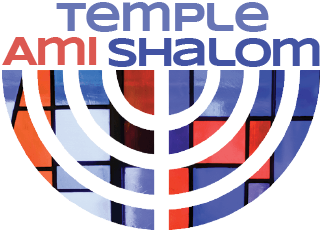Rabbi’s Message
Shavua tov and Erev Pesah kasher v’sameach!!
Wow!! There is so much that is going on in our communities and our homes…even though we are still mostly staying at home which is the right thing to be doing now. I had to go out yesterday to go to the Kosher market in Tustin for some Passover necessities. I wore my mask and I was so encouraged to see so many people wearing different kinds of masks to cover their faces and stay safe.
Once again, I was tremendously energized by our Shabbat services this past Friday night and Shabbat morning. It was so moving to see not only our TAS community but that we were joined by friends and family members across the country and even north our border with Canada. I encourage all of us to invite their families and friends to join us for our musical, participatory and uplifting Shabbat services. Please send them the Zoom links and passwords for our two services so we can all celebrate together.
I know that we are all preparing for the beginning of Pesah, Wednesday evening. And there is so much to do, especially this year. I want to just go over some of the upcoming rituals for this week. Tomorrow night we will search our homes for any remaining chametz as we prepare for the leaven-free 8 day holiday. It is traditional to search with a lit candle and a feather or brush to collect whatever we find. Any remaining chametz should be gathered and on Wednesday morning it should either be burned, flushed(if it will not stuff up piping) or thrown away as a physical symbol of ridding our homes of all leavened goods.
In addition, beginning Wednesday morning is the traditional Fast of the Firstborn Males. This is done in tribute to the firstborn male Israelites who were saved while the Egyptian firstborn males lives were taken in the last of the 10 plagues. There is little doubt that the 8 days of Passover are the most intense time in the entire Jewish year. This, I think, brings all of the rituals, many of them going back to Biblical examples, into our lives, so we can feel, even limitedly, what it must have felt like to be slaves to Pharaoh for hundreds of years…and then experiencing the joy and uplifting community feeling of being a free people. Our history as a Biblical people who were enslaved and then freed is such a significant part of who we are today. By telling and re-telling this story every year, we encourage ourselves and our children and grandchildren the importance of our story and how each one of us today still play important and on-going roles in that history.
I want to take a few moments to mention the Torah readings for the festival of Pesah. It is important to remember that in Israel Passover is celebrated for the traditional 7 days, while those of us living outside of Israel will celebrate for 8 days. The Torah is read every day of the holiday of Passover, the first and last days, Yom Tov, as well as the days in between, Chol ha-Moed, the regular days of the holiday. The Rabbis were very careful how they divided up the readings for Passover. The reading for the first day, in Israel and in the Diaspora, tells the beginning story of the Exodus(Exodus chapter 12 verse 21-51). It begins with God giving the instructions for making the Passover sacrifice made the evening before the Exodus itself. It is the sacrifice that provided the blood that was put on the doorposts of the Israelites as a guide for God as God passed over all of the houses in Egypt. The blood on the doorposts kept the Israelite firstborn alive. The reading continues with the story and ends after the Israelites have left Egypt and have begun their travels through desert but short of the Red Sea.
The reading for the 7th day, Exodus chapter 13:17-chapter 15:26, the last day in Israel and the next-to-last day outside of Israel, the Rabbis go back to the book of Exodus and continues the story to the crossing of the Red Sea and the defeat of the Egyptians.
There is so much more to this festival…we must remember that during the 2nd seder, Thursday night, we begin to count the Omer, the portion of barley, that was brought to the Temple in Jerusalem. We count the Omer for 49 days, counting each day as part of the evening and morning services. The 50th day will be the Festival of Shavuot, the Feast of Weeks.
Also, on the first day of Pesah, we change the wording in the Amidah. We stop praying for rain, geshem, during every Amidah since Sukkot in the autumn season, and we begin asking for dew, tal, to continue to fall for the spring and summer crops. Both of these prayers, for rain and dew, are not focused on our environmental needs but rather on Israel’s. Thankfully, our weather pattern in Southern California is very similar to Israel’s so it makes sense. But for Jewish communities that live in the Southern Hemisphere, their weather is opposite ours, but their prayers are the same because this prayer is focused on Israel’s needs.
Wow!! Passover, Pesah, is such a fundamental part of our Jewish lives. May we all celebrate safely in our homes this year perhaps with family through zoom or other modern methods. May we all pray together this Friday night and Shabbat morning through Zoom. May we all pray that next year, not only will we celebrate in Jerusalem, but if not in Jerusalem, at least together with our family and friends again!! Chag kasher v’sameach, a happy and healthy Passover to all of our Temple Ami Shalom!! Rabbi Ralph
President’s Message
